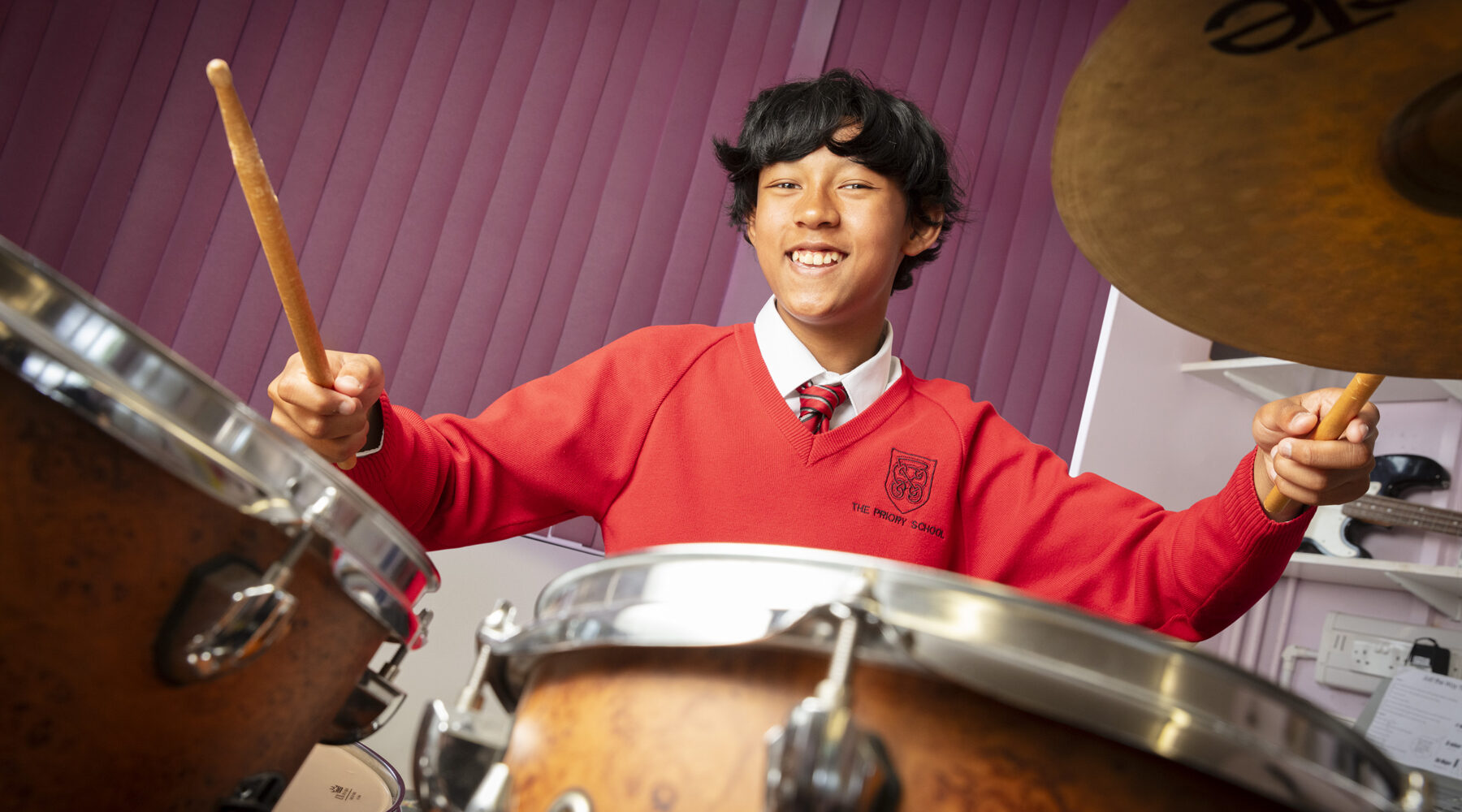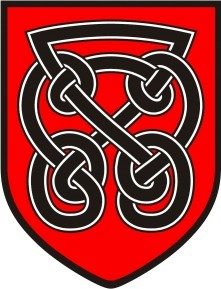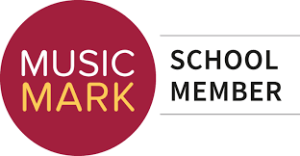
Music is a lively and vibrant department which encourages participation by all, regardless of ability or age. It is a community driven environment which enjoys many successes. We work extensively with the other schools in the area, both primary and secondary, and regularly celebrate our students’ achievements. We run fantastic choir trips abroad; we took 40 students to Australia and we took 36 students to Germany.
Curriculum
Key Stage 3
Students use a range of skills to learn the basics of song writing, music from other cultures, music-related ICT, the music business and much more. A practical approach is taken to all lessons with students having the opportunity to perform and have their work informally assessed in every lesson.
Year 7
Unit 1 – Bridging the Gap
This unit is designed to form a ‘gathering’ of the variety of musical knowledge brought by students from their primary schools. It gives students the opportunity to develop their understanding of the process of composing by creating and performing music in response to a non-musical stimuli. During the unit students explore how sounds can be used rhythmically to create a composition.
Unit 2 – Expressionism
Continuing on from the introduction of notating rhythms, students are encouraged to maintain this skill as well as developing the ability to perform by ear. They are asked to create moods and atmospheres given to them. This is a group topic and students are introduced to the un-tuned percussion.
Unit 3 – Naming the Dots
This unit is designed to give students an introduction to pitch and melody. It is intended that from this topic onwards, both pitch and rhythm will be included in classwork.
Unit 4 – ‘Scarborough Fair’
This unit is intended to follow on from the introduction to pitch. It involves students playing an arrangement of Scarborough Fair and enables them to work with a variety of class members and perform in 4-part harmony.
Unit 5 – O Generator
This unit is designed to introduce students to the software ‘O-Generator’ whilst exploring the development of polyphonic textures and complex rhythms. Students learn the basic skills of producing their own compositions using ICT and also develop their knowledge of chords and melodies covered in Unit 1.
Unit 6 – Medieval Music
This unit is designed to introduce students to the various ‘periods’ of music. They learn the names of the periods and then concentrate on the Medieval period, learning keywords and features as they go along. It is intended to include some practical work.
Year 8
Unit 1 – 16 Bar Composition
This unit develops student’s ability to use instruments and devices to compose and perform their own, and others, work. They explore the basic ideas of song writing and begin to compose in a melody/accompaniment style. They also see how composers can use musical devices and harmony to compose melodic pieces of music.
Unit 2 – ‘Walking in the Air’
This unit is designed to build on work covered during ‘Scarborough Fair’ in Year 7. Students develop their awareness of others during a 5-part harmony performance situation. They use a variety of instruments and scores.
Unit 3 – Canons and Computers
This unit is designed to introduce students to the software ‘Sibelius’ whilst exploring the structure of canons. Students learn the basic skills of producing their own compositions using ICT and also develop their knowledge of chords and melodies covered in Unit 1.
Unit 4 – Pop Performers
Students are ‘dropped into the deep end’, emulating as nearly as possible the real-life learning practices of young, beginner popular musicians. They have the generic aim of listening to a song and copying it, which is an ongoing objective that stretches over a number of lessons.
Unit 5 – O Generator 2
This unit is designed to continue from the skills learnt in year 7 with the sequencing software ‘O-Generator’. Students learn the foundations behind club-dance music and compose a piece in a similar style.
Unit 6 – Keyboard Skills
This unit is designed to introduce students to the techniques required to play the keyboard (both melody and accompaniment) and to teach them further skills on following traditional notation.
Year 9
Unit 1 – Film Music
This unit is designed to develop students’ knowledge of Sibelius and introduce them to Film Music. Students build on the skills from year eight to produce a piece of music for at least four instruments to accompany a short film clip.
Unit 2 – African Music
This unit is designed to introduce students to African music and provide them with the experience of performing music in this style. It is also particularly relevant for those students who are considering taking this subject at GCSE level.
Unit 3 – 12 Bar Blues
This unit is designed to develop students’ knowledge of the keyboard through performing and improvisation. They also learn the historical and geographical information behind blues music.
Unit 4 – Experimental Experimenting
This unit is designed to introduce students to more ‘unconventional’ music and notation. Students are encouraged to listen to and perform experimental music through graphic scores. They are also assessed on an ensemble performance from a composed graphic score.
Unit 5 – Minimalism
This unit is designed to develop students’ techniques from Year 8 in composition and performing. It also teaches further skills in following traditional notation and will act as an introduction to one of the set works studied on the GCSE course.
Key Stage Four
At Key Stage 4 students have the choice of studying either GCSE Music (following the Edexcel Specification) or BTEC Level 2 Tech Award in Music Practice. The GCSE course incorporates performing, composition and listening skills and is a mainly practical course. Students are required to complete coursework comprising of 2 compositions (30%), 2 performances (30%) and an examination at the end of the second year where they listen to music and answer questions based on familiar work they have been studying and also unfamiliar work.
The BTEC Level 2 course is equivalent to one GCSE and when successfully completed and is graded at pass, merit, distinction and distinction star. Students are required to complete three components of study with a number of tasks in each ranging from recording a musical product, using a digital audio workstation to researching genres of music. Lessons are a mixture of practical and theoretical and students are taught to comfortably use both Windows and Mac operating systems. Students use Logic to create and produce their work. This course provides them with the skills to pursue either (or both) of the Level 3 BTEC courses.
Key Stage Five
There are three different qualifications available at Key Stage 5.
- The traditional route of A Level Music following the Edexcel specification. This music pathway is the more traditional continuation of the GCSE course with the format staying very similar. A Level music is taught through the consortium arrangement, with the home centre maintaining at least one hour of contact with their own students per fortnight.
- BTEC Level 3 Music Technology – We also offer BTEC Music Technology at The Priory School for all the Consortium students. Students will cover multi track recording skills, recording techniques, studio techniques and live sound. Units selected for this unit depend largely on the skills and strengths of the individual students within the group and is a very personalised course.
- BTEC Level 3 Extended Certificate in Music Performance – This course offers the learners an opportunity to further develop their performing or composing skills as well as developing their awareness of the music industry and events management.
It is possible to study two of these courses in the combination of 1 & 2 or 2 & 3.
Enrichment
Music Ensembles
In the department there are ensemble rehearsals every week with some groups rehearsing twice a week.
The current ensembles include:
- Junior Choir
- Senior Choir
- Chamber Choir
- Big Band
- Orchestra
- Woodwind Group
- String Group
- Brass Group
- Percussion
- Staff Choir
- Male Vocal Group
- Year 8 Female Vocal Group
If a student wants to start a group that isn’t on the list – then they are always welcome to speak to us and we can look into starting it.
Music Leaders
We are proud to be in the 4th year of our music leaders scheme. Led by the student and subject lead the students can apply for roles and responsibilities within the department at the end of the school year ready for the new academic year. It’s a great opportunity to work alongside the Music department staff in providing a range of supporting roles, the details of roles can be found in the Music department. We currently have 15 music leaders who can be found proudly wearing their purple treble clef music badges and a student leadership badge.
In the Community
The department has many links with local businesses and is always looking to further this where possible. During the last few years the students have had visiting talks from local businesses and professionals.
In addition to this, they have taken part in vocal workshops with ‘Sons of Pitches’, visited TV studios, seen West End theatre shows and performed at weddings. The department also works closely with local primary schools and invites them to performances as both audiences and performers themselves. More recently, we have been visiting primary schools offering arts workshops which was very successful.
As part of the Herts Music Gala, we were invited to be performing as a solo school at the Royal Albert Hall in March 2020 and are proud that one of our Year 9 students was selected as a soloist.
We are very pleased to announce that following a nomination by Hertfordshire Music Service, the Music Department has been awarded the national recognition of ‘Music Mark’. This highlights the ongoing excellent provision we provide for our students and the opportunities made available to them. We are very proud of this award and have already received some positive feedback on our twitter account (@tps_musicdept) regarding this.
The certificate is now proudly displayed in the reception area for people to see as they arrive into school.
Careers
For information regarding possible careers in music, please visit www.careersinmusic.co.uk.
Come and see any member of the Music Department as we also have resources and can discuss any career related question you might have.
Staff
-
Mrs Lindsay Creak – Head of Music Department
-
Mrs Elizabeth White – Teacher of Music; Head of Key Stage 4
- Mr Matt Ankers – Teacher of Music and Teacher of Computing; Head of Year 7
We also have an extensive number of peripatetic staff working within the department providing students with individual instrumental lessons. Students can choose from 20 minute or 30 minute lessons on a wide range of instruments. Further information is available on request.
Links
http://www.edexcel.com – Exam Board Information
http://www.hertsmusicservice.org.uk – External Music Information
http://www.abrsm.org – External Music Information
http://www.thestudentroom.co.uk/wiki/A-Level_Music
http://music.tutsplus.com/tutorials/how-to-write-theme-variations–cms-20558 – Theme and Variations Help
GCSE 2016 Anthology
https://www.youtube.com/playlist?list=PL3q984EWyJe5fvJzadbO3lE0SoLPy-jZL – Set Works
https://www.youtube.com/playlist?list=PL3q984EWyJe7Cu2MhxIMkWvNsy8OQx-8Z – Wider Listening
O-Generator
https://thepriory.musicfirst.co.uk/app/

